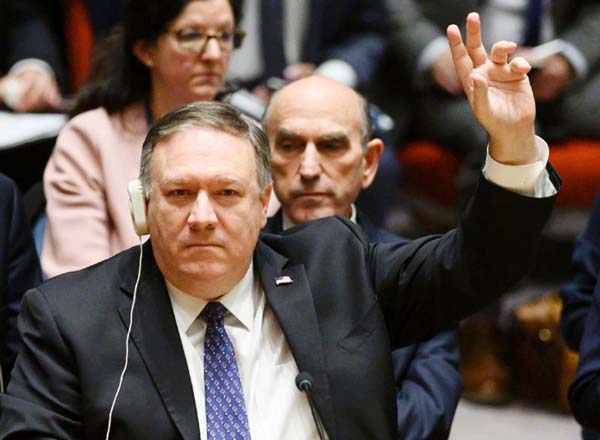
AFP, United Nations :
Venezuela’s political showdown moved to the UN where a Security Council meeting called by the US pitted backers of President Nicolas Maduro against the Trump administration and supporters of the country’s self-declared interim leader Juan Guaido.
The United States urged all nations on Saturday to support Venezuelan opposition leader Juan Guaido while Russia accused the Trump administration of attempting “to engineer a coup d’etat” against President Nicolas Maduro – a reflection of the world’s deep divisions over the crisis in the embattled Latin American country.
US Secretary of State Mike Pompeo told the UN Security Council at a meeting called by the United States that it’s beyond time to back the Venezuelan people as they try to free themselves from what he called Maduro’s “illegitimate mafia state” and back Guaido, who has declared himself the country’s interim president, arguing that Maduro’s re-election was fraudulent.But Russia’s UN Ambassador Vassily Nebenzia said Venezuela doesn’t threaten international peace and security and accused “extremist opponents” of Maduro’s legitimate government of choosing “maximum confrontation,” including the artificial creation of a parallel government.
He urged Pompeo to say whether the US will use military force.
Pompeo later told reporters who asked for a response, “I am not going to speculate or hypothesise on what the US will do next.”
What has played out in Venezuela and the world’s media between supporters and opponents of the Maduro government played out face-to-face in the chamber of the UN’s most powerful body, which has failed to take action on the Venezuelan crisis because of deep divisions, especially among the Security Council’s five veto-wielding permanent members.
The leaders of two of those council nations – France and Britain – joined Spain and Germany to turn up the pressure on Maduro on Saturday, saying they would follow the US and others in recognising Guaido unless Venezuela calls new presidential elections within eight days.
But Venezuela’s foreign minister rejected the ultimatum, insisting that Nicolas Maduro remained the legitimate president despite US-led pressure.
“Nobody is going to give us deadlines or tell us if there are elections or not,” Foreign Minister Jorge Arreaza told a special session of the United Nations Security Council.
“How is it that you can issue an ultimatum to a sovereign government?” he asked.
The opposition to Guaido was reflected in the initial procedural vote on whether the 15-member Security Council should even discuss the crisis in Venezuela, which is not on its official agenda.
The United States barely survived the vote to go ahead with the meeting, receiving the minimum nine “yes” votes from the council’s six Western nations along with Kuwait, Peru and the Dominican Republic.
China, South Africa and Equatorial Guinea joined Russia in voting “no” while Indonesia and Ivory Coast abstained.
Pompeo went after Russia and China, accusing them of trying “to prop up Maduro while he is in dire straits … in the hopes of recovering billions of dollars in ill-considered investments and assistance made over the years.”
But he saved his pointed attack for Cuba, saying no country has done more to sustain “the nightmarish condition of the Venezuelan people.” He said Cuba has sent “security and intelligence thugs” to sustain Maduro’s “illegitimate rule.”
“Now is the time for every other national to pick a side,” Pompeo said. “No more delays, no more games. Either you stand with the forces of freedom, or you’re in league with Maduro and his mayhem.”
China’s UN Ambassador Ma Zhaoxu said his government “firmly opposed” the US accusations and doesn’t interfere in the internal affairs of other countries.

